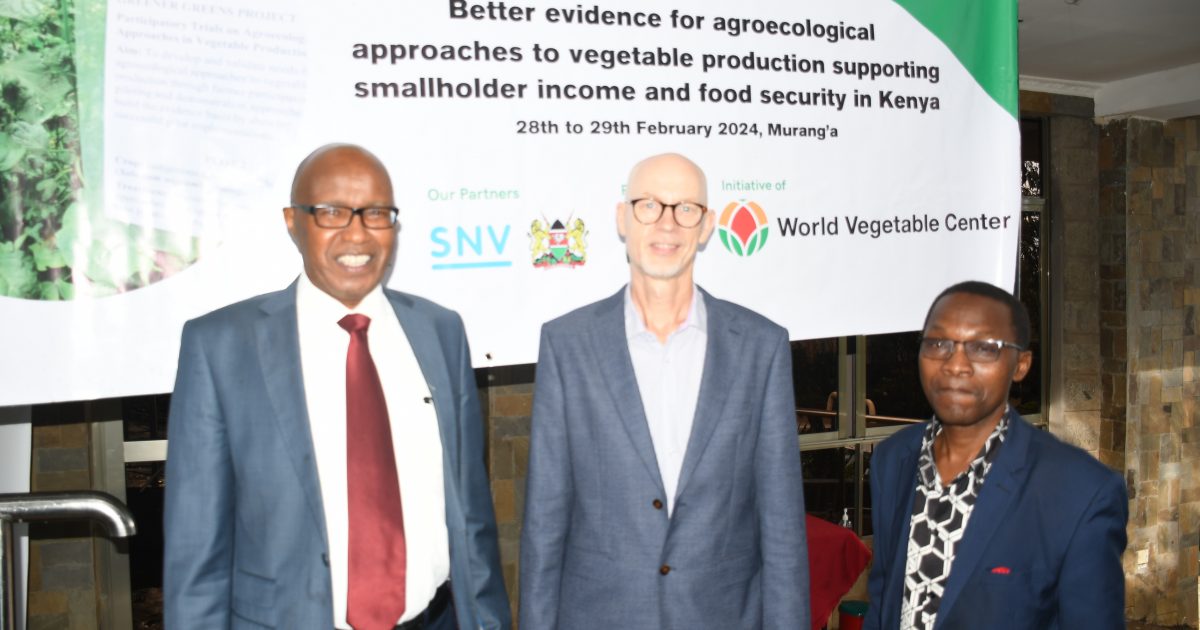A research done by a non-governmental organization has revealed that agro-ecologically grown vegetables have more yields compared to those grown through conventional practices.
The research done by World Vegetable Center (WorldVeg) in support of other organizations indicated that production of agro-ecologically grown vegetables is more by about 22 percent.
The WorldVeg in the research dubbed Greener Greens also reveals that post-harvest losses of the agro-ecological produce is much less as compared to yields produced through conventional practices.
The Greener Greens research project was carried out between 2021 and 2023 and other partners that support the project include Netherlands Development Organization (SNV), with financial support from the Biovision Foundation, and In-kind contributions from the Veggies 4 Planet & People project.
The three-year research collected data from 137 smallholder farmers mostly women and youth in traditional settings within Murang’a County who participated in the trials where they grew amaranth, African nightshade (managu), kale, and pumpkin leaves.
Results showed that amaranth grown in agroecological plots had a positive gross margin of Sh.259 (U$ 1.18), with a negative gross margin of Sh. -53 (U$ -0.36) in conventional plots.
For kale, the gross margin was Sh. 943 (U$ 6.47) compared to Sh. -36 (U$ 0.25). However African nightshade and pumpkin leaves were not profitable in either system, due to lower yields and limited market demand in the area.
Murang’a County Executive Member (CEM) for agriculture Dr Kiringai Kamau speaking during a two-day engagement workshop in a Murang’a hotel expressed deep appreciation for the Greener Greens initiative in advancing sustainable agricultural practices within the county.
Kamau stressed the importance of integrating agro-ecology in the county’s agricultural agenda and acknowledged WorldVeg and SNV for their crucial role in promoting regenerative and agro-ecological practices for vegetable production.
WorldVeg Kenya Country Director Ralph Roothaert on his part noted the research revealed that higher profitability under agro-ecological farming approaches can be attributed to the cost of savings on inputs.
“This research has contributed to debunking the myth that agroecology is not feasible and not profitable which was a concern by a lot of the scientific community,” he said.
Roothaert who is also the Principal Investigator for Veggies 4 Planet & People initiative said the results confirmed that average yields in agro-ecological plots were higher than conventional plots where chemical approaches were used for all the crops.
“During the trial, more than 90 percent of farmers were using plant extracts, sticky traps, or companion or repellant crops to control crop pests,” he said, adding that biopesticides proved to be effective in pest control.
He stated that demand for organic inputs such as compost manure, natural soil amendments, and botanical pesticides also increased notably, indicating reduced reliance on conventional fertilizers.
Murang’a County Director of Agriculture, Daniel Gitahi highlighted the significant impact of the Greener Greens research in the County in advancing the adoption of agroecological practices.
“The success of the research is providing evidence supporting agro-ecological farming for safe and healthy vegetable production,” he noted stating that this has led to improved agricultural productivity and food security in the county.
Gitahi lauded the County government for launching the Agro-Ecology Development Act and Agro-Ecology Development Policy 2022-2032, recognizing the benefits of integrating agro-ecology into the agricultural agenda.
He emphasized the need for research to strengthen local innovation capacity and facilitate knowledge sharing to promote the production of safe, locally sourced, and nutritious food.
The World Health Organization recommended daily intake of vegetables per person for a healthy diet is three portions, or about 240 grams per day. In most sub-Saharan African countries, actual intake is only around 70 grams which is 30 percent of the recommended amount.
Peninah Gakanga, one of the farmers from Ithiki village, Mukangu sub-location who participated in the research trials said the project has helped her to grow her traditional vegetables in an agroecological way which are nutritious and profitable.
She observed that due to the better-perceived taste of the agro-ecological produced vegetables, not chemically treated, producer households consumed more of these vegetables (38 percent compared to 21 percent).
Gakanga who is the chairperson of Jijenge tuinuke self-help group that comprises women who farm vegetables as their means of livelihood said that the group saw a difference in terms of quantity and quality as compared to the conventional ways of farming.
“The vegetables that were grown based on agroecological practices produced better yields than the ones that were planted using conventional ways of applying chemicals and pesticides,” she said.
On his part, David Gachoka, a youth, aged 24 years from the Jawabu Youth group, who participated in the research said that he saw an increase in the yields from his quarter-hectare piece of land once he embraced agroecological vegetable farming.
Edgar Omondi, another youth from Kangema said they saw an opportunity in seedling propagation and applying agroecological practices in his nursery.
Omondi noted that one of the challenges most farmers faced during the research period was the lack of water as a result of inconsistent rainfall. He urged farmers to practice water harvesting techniques to store water for use during dry seasons.
By Anita Omwenga





